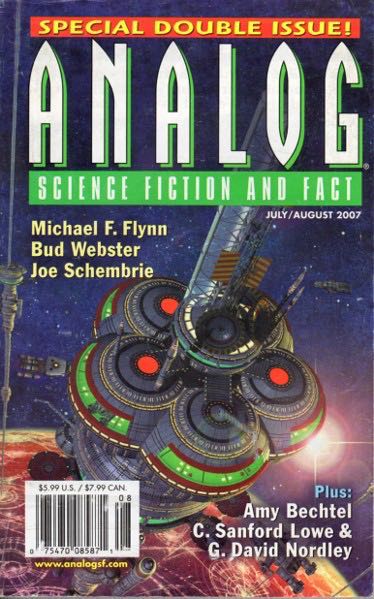Analog Science Fiction and Fact, July/August 2007
240 pages
Editor Stanley Schmidt isn't being an elitist ass in the Editor's Page column this time; he's just spouting vacuous ramblings about the bandwidth and bitrate of dreams. Sadly, he chose to include the blatantly partisan hack job Political Science, so we know he hasn't given up the political grandstanding--he's just finding writers to do it for him. The cynical part of me wonders whether he commissioned the story or wrote it himself under a pen name. But no, there's no evidence of that.
I found Loki's Realm to be a decent story. Bringing It All Back Home is fun, but Bubba's mannerisms and his aggressively folksy attitude get tiresome after the first couple of pages. I was relieved when the story ended. A Time For Lawsuits was great--I felt like I could feel the doctor getting more and more overwhelmed. It was so real that it almost made me want to stop reading.
I enjoyed Do No Harm and The Caves of Ceres. I found The Last of the Weathermen irritating not because of the story, but because of the narrator. Don't ask me why. Jimmy the Box was short but not memorable. Quaestiones Super Caelo Et Mundo, and its associated science fact article, were dull and never once resonated with me. I regret reading them.
- Novella: Loki's Realm, by C. Sanford Lowe & G. David Nordley - The Black Hole Project's expedition to Loki meets with continual setbacks, and they fear they will be unable to launch their impactor on time--which would set back the Black Hole Project for hundreds of years.
- Novella: Bringing It All Back Home, by Bud Webster - NASA asks Bubba, a kindhearted redneck with a flying saucer, to retrieve the first moon rover so it can be displayed at the National Air and Space Museum, and inspire a resurgent interest in science and exploration.
- Novelette: Quaestiones Super Caelo Et Mundo, by Michael F. Flynn - A few minor changes to history could have lead to a 14th century scientific revolution, with a moon landing in the 1700s. Novelette: A Time For Lawsuits, by Amy Bechtel - A harried, overworked country veterinarian treats "monsters" (aquatic aliens stranded on Earth, apparently) and one of them gives him an egg to take care of.
- Novelette: The Caves of Ceres, by Jon Schembrie - A nostalgic story about an independent contractor on Ceres who helps a young woman who is searching for her father's hidden treasure.
- Short story: The Last of the Weathermen, by Richard A. Lovett - A weatherman tells a story of the old days, when weather-predicting software was in its infancy: the software failed him and he nearly froze to death while hiking, but managed to save himself and rescue a girl.
- Short story: Jimmy the Box, by Scott Virtes - An airport vending machine becomes sentient, writes poetry, and lands an interview on CNN.
- Short story: Political Science, by C. W. Johnson - Politics, xenophobia, and the War on Terror lead the United States to ignore the galaxy-destroying consequences of tapping into a new kind of energy. It's a cheap shot at President George W. Bush.
- Short story: Do No Harm, by John G. Hemry - A test run of a new autonomous spaceship leads to disaster when its subsystems go berserk; the ship's doctor diagnoses it as a sort of cancer--a bug in programming leads the ship's repair systems into a pattern of uncontrolled construction, and the ship's defensive subsystems attack the growth, ultimately leading to the ship's death.
- Short-short: The Test, by Kyle Kirkland - Mankind fails the xenophobia test in a first contact situation.
- Science fact: De Revolutione Scientiarum In 'Media Tempestas', by Michael F. Flynn - A dull explanation of why the scientific revolution happened when it did, with emphasis on the progress in the so-called Dark Ages that laid the foundations for the revolution. But anybody who knows anything already knows the Dark Ages weren't.
